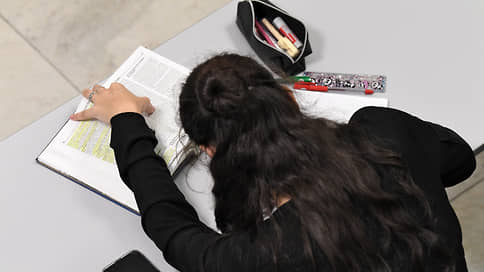Do not chat on chat – Newspaper Kommersant No. 19 (7464) dated 02/02/2023
[ad_1]

The Russian State University for the Humanities (RSUH) called for limiting students’ access to one of the popular chatbots “because of its possible negative impact on learning.” They indicate that “the educational community is facing a new challenge associated with the use of neural networks and artificial intelligence.” Such a reaction followed the story of the defense of Alexander Zhadan’s thesis, which received wide public response: the fifth-year student admitted that he wrote it using a neural network. The Ministry of Education and Science has not yet responded to the situation. Experts emphasize that even an advanced neural network cannot achieve the main thing: come to one or another meaningful conclusion.
A fifth-year student of the Russian State Humanitarian University Alexander Zhadan, as he claims, wrote thesis on the topic “Analysis and improvement of the management of a gaming organization”, using artificial intelligence. “I was able to write the introduction and the theoretical part using ChatGPT, based on requests: I have a plan, please give me the text for my diploma,” said Alexander Zhadan. “He indicated how many characters I needed. In the second and third parts, which are devoted to practical activities, I had to highlight what I did directly in the organization. I combined my work with others so that I could build on someone else’s text.” It should be noted that Mr. Zhadan works as a brand manager at CM Games, which develops games.
ChatGPT is an advanced AI chatbot launched in November 2022. ChatGPT can answer questions, translate texts, solve math problems, write legal documents, generate stories on given topics (from school essays to scientific papers), write code in several programming languages (for example, Python), process queries in natural languages (including Russian). In the first five days since its release, it has gained more than 1 million users. The chatbot was created by OpenAI, which is run by Sam Altman, ex-president of Y Combinator venture fund. OpenAI is also known for its DALL-E neural network, which is capable of creating paintings based on text queries.
“The supervisor drew attention to the fact that I have incoherence in my work, that I need to improve the Russian language, and I was actively involved in this in the process,” shared Mr. Zhadan. “I tried to do it through the chat bot, but it turned out a little . I ended up editing more myself, but also looking at what ChatGPT has to offer.” According to the student, the work took several days, but a total of 23 hours. A few days ago, according to Alexander Zhadan, he defended his work. The diploma, according to him, was tested for anti-plagiarism: 82% of the originality of the text.
The scandal surrounding the history of student Zhadan’s diploma defense began after several media outlets told about it. The RGGU was forced to make an official statement. “If decades ago the main problem for universities was plagiarism and unscrupulous borrowing, and this problem was successfully solved, now the educational community is facing a new challenge related to the use of neural networks and artificial intelligence in scientific and educational activities,” Kommersant was told in the press service of the university. “Russian and foreign experts are expressing concerns about the problem that has arisen, and finding a worthy solution is the main task of the scientific community.” The situation “actualized the need for prompt solution of problems related to the development of tools for recognizing the use of neural networks in the preparation of written work (term papers, essays, abstracts, WRC)”, emphasize the educational institution.
The Russian State University for the Humanities promised that specialists and the scientific community would re-analyze the thesis.
In the meantime, they proposed “limiting access to the ChatGPT chatbot in educational organizations due to its possible negative impact on learning,” without explaining how this should be done. Kommersant asked the Ministry of Education and Science to comment on the proposals of the representatives of the Russian State Humanitarian University, but the department did not promptly respond.
The head of the action recognition group at NtechLab (one of the world’s largest suppliers of video analytics systems) Dinar Akhmatnurov emphasizes that language neural networks mastered writing coherent texts a few years ago. “Essentially, these are language modules that are trained using a wide selection of textual information. They can really write lyrics that seem very coherent to us.” But, Mr. Akhmatnurov emphasizes, even an advanced neural network capable of writing a school essay or a scientific paper cannot do the main thing: come to one or another meaningful conclusion. “Linguistic neural networks, and this is very important to understand, are good at imitating the language style, but they are not capable of drawing conclusions on their own or bringing scientific novelty to the work. These programs do not think, but only pretend well. However, perhaps this is enough to defend the thesis, which the commission will read diagonally,” he sums up.
“The situation with the neural network proved that there are serious problems with graduation papers in Russia,” said Oleg Tsapko, chairman of the All-Russian Student Union. Mr. Tsapko also draws attention to the fact that “a neural network cannot write a good paper on its own”, therefore “it is important to look at the content of the paper, and not at the numbers of Anti-Plagiarism”.
[ad_2]
Source link








